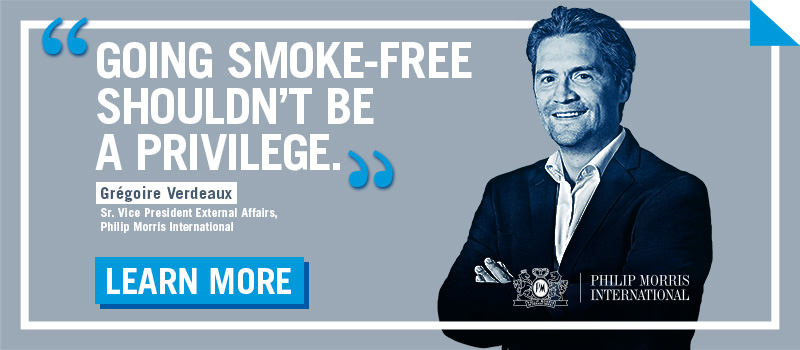Everyone deserves access to a smoke-free future Leave a comment

Sponsored
As world leaders gather in New York for the United Nations General Assembly, Philip Morris International SVP of External Affairs Grégoire Verdeaux explains how innovation can be leveraged to tackle the world’s most difficult challenges.
By Sean McMahon
Published: September 21, 2022

The world leaders gathering in New York City this week for the United Nations General Assembly aim to tackle the world’s most difficult challenges. SmartBrief recently caught up with Grégoire Verdeaux, SVP of External Affairs at Philip Morris International, to hear his thoughts on how innovation can be leveraged to shape the future.
How can society harness the full potential of scientific innovation?
Innovation and disruption can solve problems, fulfill unmet consumer needs, and achieve things few imagined possible. But ensuring that disruptive innovation is delivered equitably requires fresh thinking, especially by regulators and policymakers.
Regulating novel products is rarely something lawmakers get right the first time, particularly when governments lack the relevant expertise and up-to-date research. Once a needed product becomes available, it too often remains inaccessible or unaffordable. When the benefits of scientific and technological advances fail to reach those who need them most, something has to change.
We need to put equity at the center of how we regulate innovation.
How can governments better support technological solutions to pressing issues?
By implementing informed legislation that anticipates technological advances and adapts easily to shifting market realities, policymakers can address many of the barriers that currently impede progress.
How can governments accelerate the end of cigarettes?
Better, smoke-free alternatives to cigarettes now exist. Governments need to make these better products accessible to those adults who would otherwise continue to smoke while preventing unintended use by minors and nonsmokers. The key is risk-proportionate policies that encourage adult smokers at all income levels to move away from the most harmful form of tobacco and nicotine consumption: cigarettes.
What needs to happen to end cigarette use globally?
Today, worldwide movements exist to prioritize renewable energies over fossil fuels and organic food production over chemical enhancements. Ending cigarettes can be another goal for our times. We have an opportunity to work together—businesses, government, public health authorities, consumer groups, and others—to make this happen.
For more information, visit PMI.com/rethinkdisruption.


